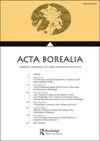The art of governing and everyday resistance: “rationalization” of Sámi reindeer husbandry in Norway since the 1970s
IF 0.6
4区 社会学
0 HUMANITIES, MULTIDISCIPLINARY
引用次数: 26
Abstract
ABSTRACT Since the late 1970s, a policy objective in Norway has been to rationalize Sámi reindeer husbandry. Among the government officials, there is, however, a concern that this objective has not been successfully met in West Finnmark due to “too many reindeer” and “too many pastoralists” degrading the pastures and jeopardizing the economy of pastoralism. Engaging with the concepts of “the art of governing” and “everyday resistance”, we examined the state rationalization programme. We identified four “techniques of power” used by the state to stimulate “rational” pastoral practices: discipline, neoliberal rationality, sovereign power, and truth. Based on in-depth interviews with pastoralists and government officials, observations, and written sources, we examined the public and hidden transcripts about rationalization. The analysis demonstrates how everyday forms of resistance are used by pastoralists to maintain control of their own livelihoods and practices. A common strategy is to partly adopt and partly avoid state regulations. Individual responses to the rationalization are determined by personal desires and capacity, as well as relationships to and the behaviour of fellow pastoralists. However, the governance of Sámi pastoralism since the 1970s affected power relations between the state and the pastoralists, as well as within the herding communities.治理的艺术和日常抵抗:1970年代以来,Sámi挪威驯鹿饲养的“合理化”
自20世纪70年代末以来,挪威的一项政策目标一直是使Sámi驯鹿养殖合理化。然而,政府官员担心,由于“太多的驯鹿”和“太多的牧民”使牧场退化,并危及畜牧业的经济,这一目标未能在西芬马克成功实现。结合“治理艺术”和“日常抵抗”的概念,我们考察了国家合理化计划。我们确定了国家用来刺激“理性”牧灵实践的四种“权力技术”:纪律、新自由主义理性、主权权力和真理。基于对牧民和政府官员的深入访谈、观察和书面资料,我们研究了有关合理化的公开和隐藏的文字记录。分析表明,牧民如何利用日常形式的耐药性来维持对自己生计和做法的控制。一种常见的策略是部分采用、部分避开国家规定。个人对合理化的反应取决于个人的欲望和能力,以及与其他牧民的关系和行为。然而,自20世纪70年代以来,Sámi畜牧业的治理影响了国家与牧民之间以及牧民社区内部的权力关系。
本文章由计算机程序翻译,如有差异,请以英文原文为准。
求助全文
约1分钟内获得全文
求助全文

 求助内容:
求助内容: 应助结果提醒方式:
应助结果提醒方式:


